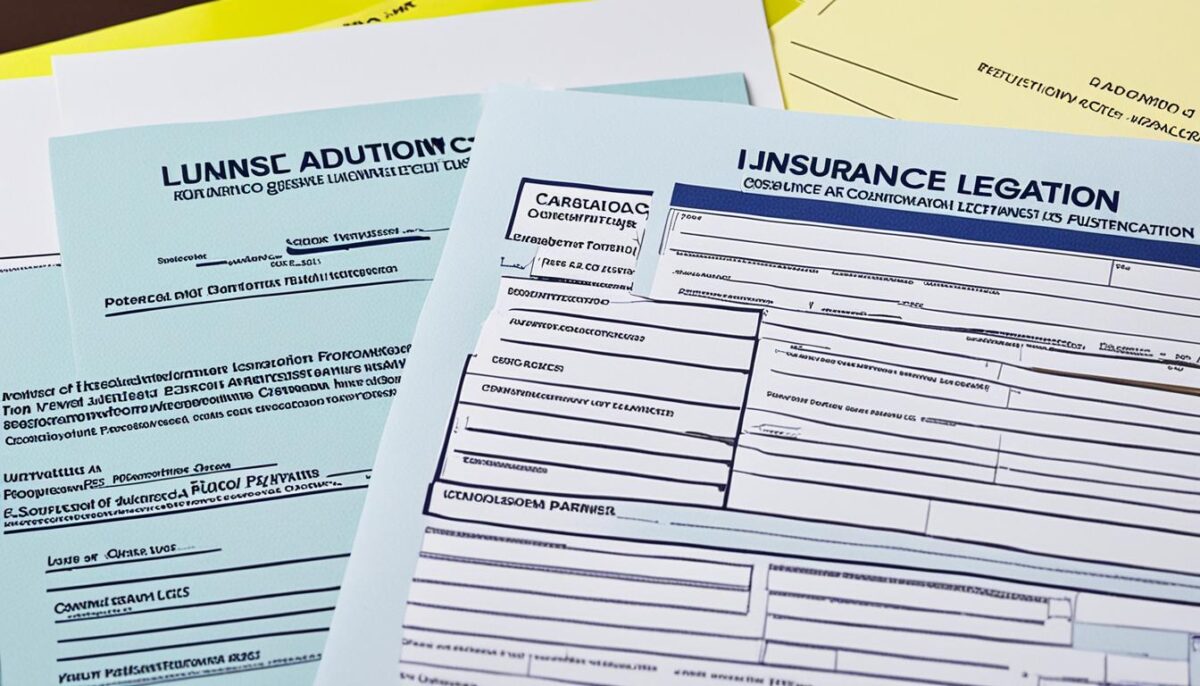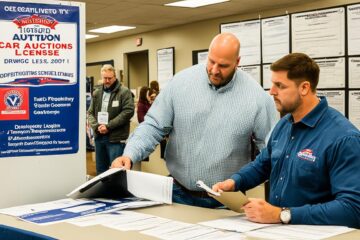If you’ve ever been captivated by the thrill of an auction and are ready to enter the exciting world of car auctions, you’ve come to the right place. In this section, we will guide you through the process of obtaining a car auction license, so you can join the auction world and start bidding on cars.
Whether you’re a seasoned car enthusiast looking to turn your passion into a business or someone who simply appreciates the excitement of competitive bidding, getting a car auction license is the first step towards participating in this fast-paced industry.
By obtaining a car auction license, you gain access to a wide range of vehicles, from classics to exotics, at competitive prices. You’ll have the opportunity to buy and sell cars, connect with fellow enthusiasts, and potentially turn your love for automobiles into a profitable venture.
Not sure where to start? Don’t worry, we’ve got you covered. In the following sections, we will break down the steps to obtain a car auction license, discuss the requirements you need to meet, and provide information on the licensing authorities in the field. With our comprehensive guide, you’ll be well-equipped to navigate the process and embark on your journey into the world of car auctions.
So, let’s dive in and explore everything you need to know about getting a car auction license. Get ready to join the auction world and experience the excitement of bidding on your favorite vehicles!
Steps to Obtain a Car Auction License
Obtaining a car auction license is an exciting endeavor that allows you to delve into the world of buying and selling vehicles. To help you navigate through the process, we have outlined the essential steps to secure your car auction license smoothly.
- Research the Requirements: Start by researching the specific requirements for obtaining a car auction license in your state or region. These requirements can vary, so it’s crucial to understand the local regulations and guidelines. Contact your local licensing authority or visit their website to gather all the necessary information.
- Complete the Application: Once you have thoroughly researched the requirements, proceed with completing the license application. Fill out all the required fields accurately, providing any supporting documents as requested. Double-check the application to ensure all information is correct.
- Attend the Required Training: In some cases, applicants may need to attend mandatory training sessions or workshops related to car auction operations. These training programs provide valuable insights into the industry, best practices, and legal obligations. Be sure to comply with any training requirements mandated by your licensing authority.
- Submit Documentation: Alongside your license application, you will need to submit specific documentation. This typically includes proof of identity, proof of residency, financial statements, background checks, and potentially additional requirements depending on your jurisdiction. Ensure all required documents are gathered and submitted promptly.
- Pay the License Fee: Licensing fees may vary depending on your location and the type of license you are applying for. Research the applicable fees and ensure you have the necessary funds available to pay the required amount. Prompt payment will expedite the processing of your application.
- Undergo Inspections: To ensure compliance with safety and operational standards, your licensing authority may conduct inspections of your proposed car auction facility. Prepare your site accordingly, addressing any necessary modifications or improvements to meet the required standards.
- Review and Approval: Once you have submitted your application, documentation, and fees, your licensing authority will review your materials. This process may take some time, and you may be required to provide further information or clarification. Stay in regular contact with the licensing authority to track the progress of your application.
- Receive Your License: After successfully passing all requirements and inspections, you will receive your car auction license. Congratulations! Your hard work and dedication have paid off, and you are now ready to embark on your journey in the exciting world of car auctions.
By following these steps, you can confidently pursue your ambition to obtain a car auction license. Remember, each jurisdiction may have specific nuances and requirements, so be sure to conduct thorough research and consult the appropriate authorities throughout the process.
Meeting the Requirements for a Car Auction License
If you’re considering obtaining a car auction license, it’s crucial to familiarize yourself with the requirements and eligibility criteria. Meeting these requirements will ensure that you’re on the right track to becoming a licensed car auctioneer.
Educational Qualifications
One of the fundamental requirements for obtaining a car auction license is having the necessary educational qualifications. Most states require individuals to have at least a high school diploma or its equivalent. However, it’s essential to check with your local licensing authority to determine whether any additional educational requirements apply. Acquiring the required educational qualifications will demonstrate your commitment and readiness to enter the car auction industry.
Financial Stability
A sound financial standing is another key aspect taken into consideration when applying for a car auction license. Licensing authorities want to ensure that applicants have the necessary financial stability to effectively operate a car auction business. Providing proof of sufficient funds or financial backing will help demonstrate your financial capability and commitment to the industry.
Experience in the Automotive Industry
While not always a mandatory requirement, having prior experience in the automotive industry can significantly enhance your chances of obtaining a car auction license. An industry background will equip you with the necessary knowledge and understanding of the market, allowing you to navigate the challenges of running a successful car auction business. If you lack direct experience, consider partnering with someone who possesses relevant industry expertise to strengthen your application.
Operational Facilities
To obtain a car auction license, you’ll need to have suitable operational facilities in place. This includes having a dedicated location where you can conduct auctions, store vehicles, and handle administrative tasks. Ensure your facility complies with local regulations and offers a safe and secure environment for buyers and sellers. Having a well-equipped facility will not only help you meet the licensing requirements but also attract potential clients and establish your credibility in the market.
Licensing Fees and Application Process
Lastly, it’s important to be aware of the specific licensing fees and application processes in your jurisdiction. Different states may have varying fees and application requirements, such as background checks, fingerprinting, and documentation submission. Research and understand the process thoroughly to avoid any delays or complications during your application. Being prepared and organized will streamline the licensing process and help you acquire your car auction license efficiently.
By meeting the requirements outlined above, you’ll be well-prepared to embark on your journey to become a licensed car auctioneer. Remember to stay informed and consult with the relevant licensing authorities in your area for the most up-to-date and accurate information.

Licensing Authorities for Car Auctions
When it comes to obtaining a car auction license, it’s essential to understand the role of the licensing authorities and regulatory bodies involved. These organizations ensure that auctions are conducted in a fair and transparent manner, protecting both buyers and sellers.
At the state level, auction license authorities oversee the licensing process and enforce regulations specific to each state. They may require applicants to meet certain criteria, such as providing proof of financial stability and demonstrating knowledge of auction practices. Additionally, they may conduct background checks to ensure that individuals involved in car auctions have a clean record.
On a federal level, regulatory bodies such as the Federal Trade Commission (FTC) and the Department of Justice (DOJ) play a crucial role in ensuring compliance with federal laws and regulations. These bodies focus on preventing fraudulent activities, ensuring fair competition, and protecting consumer rights. They monitor auctions for any deceptive practices, handle complaints, and take legal action against violators.



0 Comments